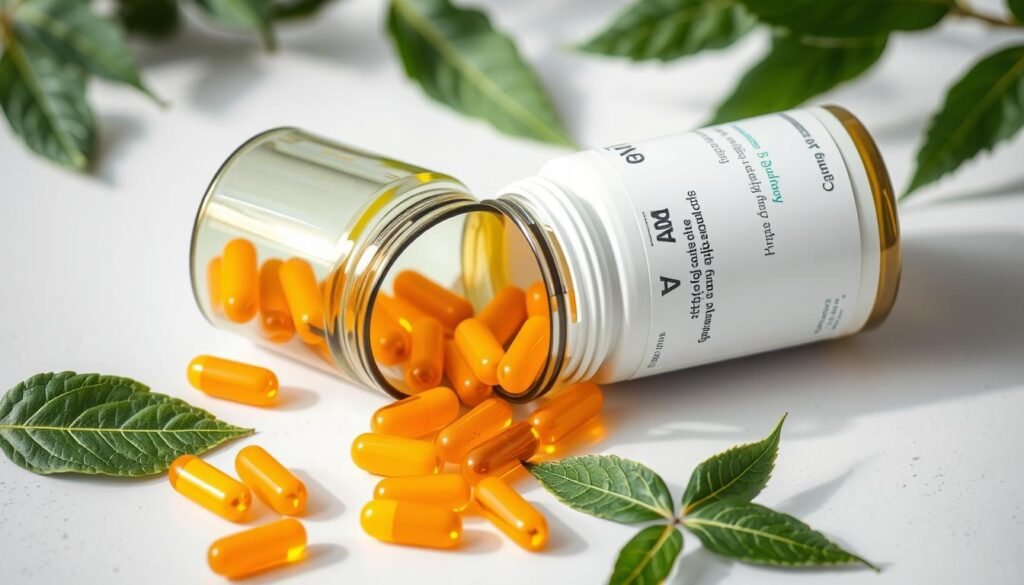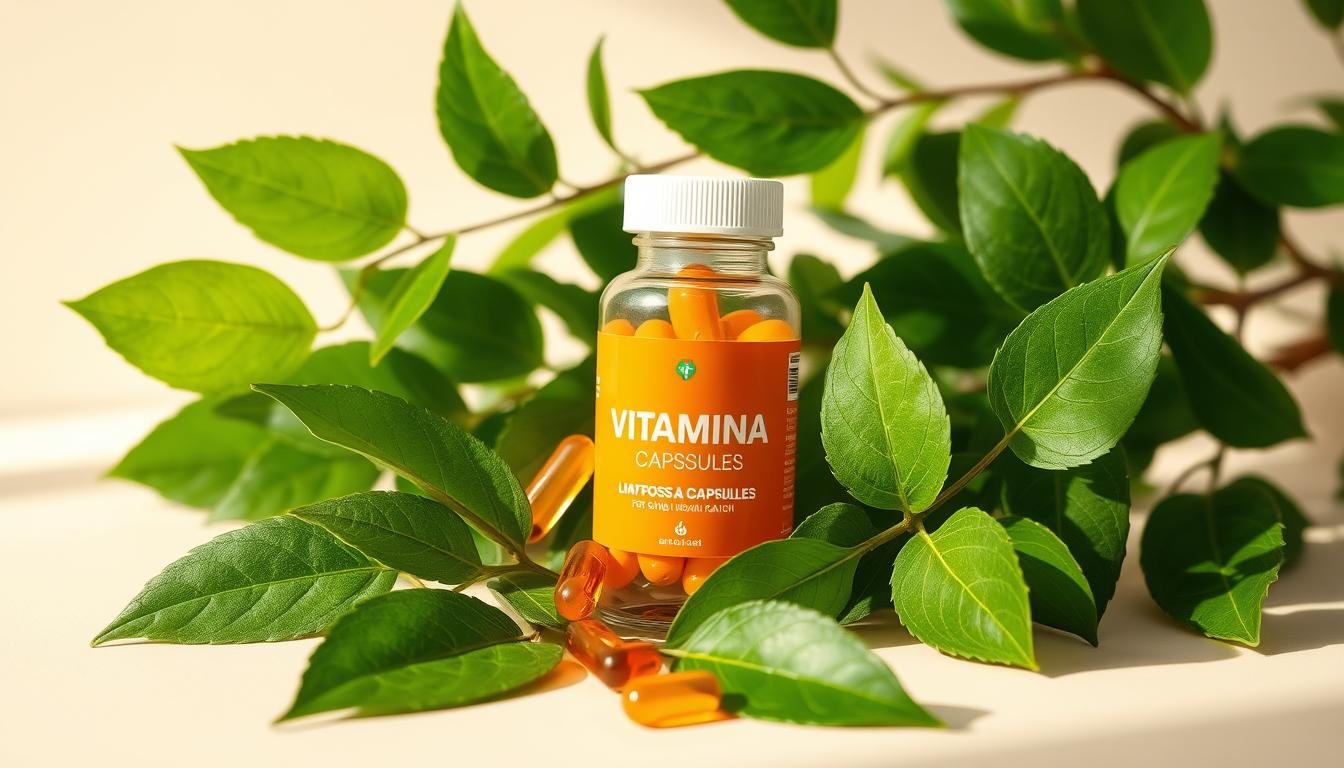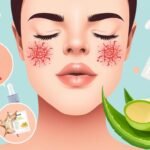Vitamin A deficiency is rare in the United States. Yet, many use vitamin A supplements for acne management. The daily recommended amount is 900 mcg for adult men and 700 mcg for adult women1.
The optimal dosage for treating acne is still debated. Dermatologists and skin care enthusiasts continue to discuss this topic.
Vitamin A is vital for healthy skin. Its antioxidant properties may protect cells from free radicals. Some studies suggest vitamin combinations with beta-carotene may reduce age-related macular degeneration risk by 25 percent1.
The effectiveness of oral vitamin A for acne is uncertain. Large doses don’t significantly affect acne, according to some studies1. However, the American Academy of Dermatology recommends topical retinol for acne treatment2.
Key Takeaways
- The recommended daily amount of vitamin A varies based on age and gender
- Vitamin A’s antioxidant properties may provide skin benefits
- Oral vitamin A supplements have limited evidence for acne treatment
- Topical retinoids, derived from vitamin A, are effective for acne management
- Excessive vitamin A intake can lead to adverse health effects
Explore our site for top beauty supply reviews. We cover acrylic nails, nail polish remover, and hair color kits. Find the best hair growth serums, skincare routines, and moisturizers for dry skin.
Discover vegan and cruelty-free makeup options. Learn about anti-aging creams, foundations for oily skin, and quality makeup brushes. Don’t miss our beauty blender recommendations.
The Role of Vitamin A in Acne Treatment
Vitamin A is crucial for treating acne and maintaining healthy skin. It offers hope to those battling this common skin issue. Vitamin A is available over the counter for acne treatment3.
Antioxidant Properties of Vitamin A
Vitamin A’s antioxidants protect skin from free radical damage. This helps reduce inflammation and promote clearer skin. It also regulates skin tone and minimizes acne-related discoloration3.
Vitamin A reduces oil gland size and activity. This decreases acne-causing oil production, especially beneficial for oily skin. It helps prevent clogged pores and comedone formation, which lead to acne lesions3.
Vitamin A Deficiency and Acne
Vitamin A deficiencies are rare in developed nations with balanced diets. However, eating vitamin A-rich foods can optimize levels and skin health4. Adequate intake supports skin’s defenses against acne and promotes a clearer complexion.
Acne severity varies from mild to severe. Mild acne has up to 20 blackheads or whiteheads, 15 inflamed lesions, or 30 total lesions3. Moderate acne involves 20-100 blackheads or whiteheads, 15-50 inflamed lesions, or 30-125 total lesions3.
Severe acne includes more than 5 cysts or nodules, over 100 blackheads or whiteheads, or more than 125 total lesions3. In severe cases, over-the-counter treatments may not work, requiring professional medical help3.
Vitamin A helps treat acne through antioxidants and sebum regulation. It can be used in topical or oral form. Allow twelve weeks to assess its effectiveness in treating acne3.
Consult a dermatologist for personalized guidance, especially for severe acne. Check back for beauty tips and reviews on acrylic nails, nail polish remover, hair color kits, and more.
Oral Vitamin A Supplements for Acne

Oral vitamin A supplements are a popular acne treatment. They deliver this essential nutrient effectively. Vitamin A is crucial for cell growth and healthy skin5.
Understanding recommended daily amounts is important. High-dose therapy may benefit severe cases.
Recommended Daily Amounts of Vitamin A
Daily vitamin A intake varies by age and gender. Women need 700 micrograms, while men need 900 micrograms6. Vitamin A toxicity is rare, but excessive doses may cause side effects6.
MINDBODYSKIN® provides 6,110 micrograms daily, 679% of the recommended value6. Always consult a healthcare provider before starting vitamin A supplements6.
High-Dose Vitamin A Therapy for Severe Acne
High-dose vitamin A therapy may help severe acne. Isotretinoin is effective but has major side effects and health risks6. Accutane can cause dry skin, hair loss, and birth defects5.
The upper daily limit for adults is 25,000 mcg to avoid toxicity5. Low-dose supplements show good results with fewer side effects6.
MINDBODYSKIN can lead to clearer skin in 7-10 days5. The correct dosage depends on the type and acne severity6.
Vitamin A can help reduce and prevent inflammatory acne due to its antioxidant and anti-inflammatory properties5.
Choose a balanced approach to skin health. Include vitamin A with other beneficial ingredients like DIM and liver detoxifiers5. Work with a healthcare professional to find your best treatment plan.
Check back for reviews on beauty supplies. We cover acrylic nails, nail polish remover, hair color kits, and more. Find the best products for your skincare and makeup needs.
How Much Vitamin A for Acne Treatment
Proper vitamin A dosage is vital for effective acne treatment. It can yield great results while minimizing side effects. Oral vitamin A supplements work well for severe acne.
Effective Dosage Range for Oral Vitamin A
Oral vitamin A dosages for acne can range from 36,000 IU to 500,000 IU daily7. Many studies found success with 100,000 IU/day for treating acne7.
However, high doses taken long-term can cause side effects. These include bone thinning, liver damage, headaches, and skin irritation8.
Duration of Treatment for Optimal Results
Treatment with oral vitamin A for acne typically lasts seven weeks to four months7. This isn’t a quick fix. Patience and consistent use are key for the best results.
Monitoring for Side Effects and Toxicity
It’s crucial to watch for side effects when using oral vitamin A. A healthcare provider should monitor excessive use to avoid potential harm8.
Oral vitamin A can cause side effects similar to isotretinoin. These include dry skin and chapped lips7.
| Dosage Range | Duration of Treatment | Potential Side Effects |
|---|---|---|
| 36,000 IU to 500,000 IU per day | 7 weeks to 4 months | Bone thinning, liver damage, headaches, diarrhea, nausea, skin irritation, joint and bone pain, birth defects |
Work with a dermatologist when using oral vitamin A for acne. They’ll help find the right dose for you. They’ll also watch for side effects during treatment.
I’ve found that a balanced approach to vitamin A supplementation, under the guidance of my dermatologist, has been key in managing my severe acne. It’s not a one-size-fits-all solution, but with proper monitoring and patience, it can make a significant difference in achieving clearer, healthier skin.
Check back often for the best reviews on beauty supplies, including the best acrylic nails, best nail polish remover, best hair color kit, best hair growth serum, best skincare routine, best moisturizer for dry skin, best vegan beauty products, best cruelty-free makeup, best anti-aging cream, best foundation for oily skin, best makeup brushes, and the best beauty blender.
Topical Vitamin A for Acne
Topical vitamin A treatments effectively manage acne. They boost collagen and elastin production for skin health9. The American Academy of Dermatology recommends topical retinoids for acne treatment9.
About 75% of acne vulgaris patients benefit from topical vitamin A treatment10. These treatments work well for both teens and adults.
Retinoids: Vitamin A Derivatives for Acne
Retinoids are among the best vitamin A products for acne. They unclog pores, reduce inflammation, and promote cell turnover. Topical vitamin A outperforms sulphur-resorcinol-salicylic acid in controlled studies10.
Results vary when comparing topical vitamin A with benzoyl peroxide10. Apply vitamin A acid to dry skin to minimize irritation10.
For best results, use topical vitamin a for acne as directed by your dermatologist. Consistency is key to seeing improvements.
Combining Topical and Oral Vitamin A Treatments
Combining topical retinoids with oral vitamin A may enhance benefits for moderate to severe acne. Tetracycline can be given alongside topical vitamin A for moderate to severe lesions10.
Monitor for side effects when using vitamin A treatments. Excessive use can lead to liver damage and birth defects9.
Patient education is crucial during initial treatment. It helps address microcomedones conversion to pustules before desquamation10.
Vitamin A derivatives can effectively manage acne in your skincare routine. Consult a dermatologist for the best treatment plan. Check back for reviews on beauty supplies, including vegan products and skincare essentials.
FAQ
What is the recommended daily amount of vitamin A for acne treatment?
Can vitamin A deficiency contribute to acne?
What are the best sources of natural vitamin A for acne?
How long does it take to see results from vitamin A acne treatment?
What are the potential side effects of high-dose vitamin A therapy for acne?
Can topical vitamin A be used for acne treatment?
Source Links
- Vitamin A – https://www.mayoclinic.org/drugs-supplements-vitamin-a/art-20365945
- Vitamin A for Acne: Scars, Benefits, Dosage, Topicals vs. Oral, More – https://www.healthline.com/health/vitamin-a-for-acne
- Vitamin A – acne support – https://www.acnesupport.org.uk/treatment/vitamin-a/
- Vitamin A for acne: Benefits, types, and uses – https://www.medicalnewstoday.com/articles/vitamin-a-for-acne
- Does Taking Vitamin A Help Clear Acne? – https://clearstem.com/blogs/skin-care-learning-center/does-taking-vitamin-a-help-clear-acne?srsltid=AfmBOooBWjFfO19-tH5rtx1HKFANUFplBtR4Ja11IYuWhkC1LkrYbjEF
- Vitamin A for Acne: Dosages, Benefits, and How to Use It Safely – https://clearstem.com/blogs/skin-care-learning-center/vitamin-a-for-acne?srsltid=AfmBOopxki6Tx2rioCo2kEj91i6A5q7K3nSkgA9w1W6dNAZsnxU2KYc3
- Oral vitamin A could become an alternative to isotretinoin for acne – https://hospitalpharmacyeurope.com/clinical-zones/dermatology/oral-vitamin-a-could-become-an-alternative-to-isotretinoin-for-acne/
- Ask an expert: Does using vitamin A help acne? | Curology – https://curology.com/blog/ask-an-expert-vitamin-a-for-acne/
- What Can Vitamin A Do for Your Skin? – https://www.healthline.com/health/vitamin-a-for-skin
- Vitamin A acid: a review of its pharmacological properties and therapeutic use in the topical treatment of acne vulgaris – PubMed – https://pubmed.ncbi.nlm.nih.gov/145940/








Surely, isnt it better to fix diet issues causing Vitamin A deficiency instead of relying on supplements? Seems lazy to me.
Interesting read but doesnt overdosing Vitamin A harm the liver? We need a holistic approach to acne treatment, not quick fixes.
Interesting read, but isnt high dosage of Vitamin A toxic? Maybe natural sources are safer than supplements. Thoughts?
Agreed. Nature knows best. Supplements are just a money-making industry.
Interesting read, but arent we overlooking the potential toxicity of overconsumption of Vitamin A? Lets balance the narrative, guys!
Has anyone considered overdosing on Vitamin A may actually lead to worse acne? Just food for thought, folks.
Interesting read, but isnt it possible that excessive Vitamin A could actually trigger acne instead of treating it? Just a thought.
I get the Vitamin A connection, but isnt it more about balanced diets and skin hygiene? Lets not overcomplicate acne treatment, folks.
Interesting read. But isnt it possible that acne is more related to diet and lifestyle rather than just a vitamin A deficiency?
Interesting read, but isnt too much Vitamin A toxic? Maybe its better to focus on a balanced diet instead of supplements. Just a thought.
Interesting read, but isnt there a risk of Vit A toxicity if its over-consumed for acne treatment? Just a thought.